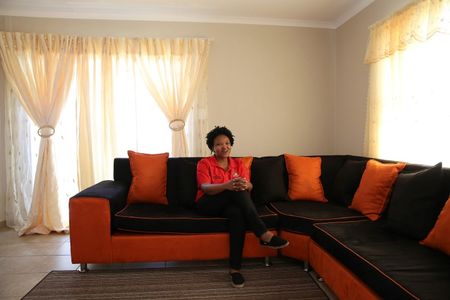By Ed Stoddard
RUSTENBURG South Africa (Reuters) - South African platinum miner Vincent Nyeleka has just moved up in the world, leaving behind a cramped hovel that he rented for a new, three-bedroom house he can call his own.
"This is better. Now my wife and children can come live with me," said Nyeleka, a 32-year-old winch operator, as he walked through his new neighbourhood, its streets lined with brick houses and green lawns.
Nyeleka's path to a middle class existence has been paved by a 2.8 billion rand (£157.8 million) housing project put together by his employer, platinum producer Royal Bafokeng Platinum (J:RBPJ), and the National Union of Mineworkers (NUM).
Mining companies in South Africa have various social policies they are required to implement but this is the first that strives to give miners a shot at owning middle-class homes that for most would otherwise be beyond their wildest dreams.
RBPlat, a mid-sized player in the industry, is a rare black-owned mining company that grew from the investment business of the Bafokeng people who live around the world's richest deposits of platinum in the North West province of South Africa.
One of the project's goals is to check the shanty towns which have mushroomed on the platinum belt west of Johannesburg.
It replaces what is known as the "living out allowance" - given directly to workers in their pay - with a "home owners' contribution" that goes toward a house loan instead of being included in the employee's salary.
The living out allowance has become increasingly popular in the post-apartheid era as workers choose to take the cash rather than stay in the basic housing provided on mine premises.
But it has had unintended consequences as miners, often rural migrants, rent only cheap shacks so they can divide the rest between the upkeep of wives and children living near the mine and other family members back in their home village.
As a result, overcrowded shanty towns lacking basic services have sprung up around the mines.
"With the housing allowance, people generally pocket the cash and then go for a shack," NUM General Secretary Frans Baleni told Reuters.
For 30-year-old Rorisang Modingoane, a miner and single mother, the new house means she and her nine-year-old daughter were able to leave her mother's small home where eight family members lived.
"People were sleeping on the floors, sharing rooms at my mother's," she said as she sat in the relatively spacious living room of her new home.
As well as space, Modingoane now has security. The housing estate is a sealed off "gated community" with guards at the entrance - a middle class lifestyle far removed from the rough and tumble squatter camps around the mines which have high rates of violent crime.
UNION CLAW BACK
For the NUM, the housing scheme is also crucial as it needs to be seen delivering better conditions on the platinum belt after losing tens of thousands of disgruntled members in the past three years to the militant Association of Mineworkers and Construction Union (AMCU), which led a five-month strike this year in the sector.
Nyeleka and several other NUM members who have been given the keys to their new houses were pointedly wearing the union's red T-shirts at the project's launch on Tuesday.
RBPlat is one of the last strongholds in the platinum industry for NUM, a key ally of the ruling African National Congress which has seen its support among miners ebb with AMCU's rise.
Finance for the project is being provided by a development finance agency but its name has not yet been released because details are being finalised.
Already, though, more than 400 new homes have been built and the project will see another 3,100 erected over the next five years, providing housing for all of the company's employees. The mortgage repayment time is about 18 years.
Typically, the living out allowance would have been around 2,200 rand a month, on top of basic pay of 7,500 rand.
Now, that 2,200 rand will go to the home loan and the workers will pay out an additional 700 rand a month themselves - giving them a sense of contributing to their own equity.
For Nyeleka, it has been a long journey from his home in the rural Eastern Cape province, hundreds of kms (miles) away.
He followed his father, who works for another platinum company nearby and still gets a living out allowance that he uses to rent a single room.

"My father now comes to visit me on the weekends," Nyeleka said with a grin.
(Editing by Sophie Walker)
